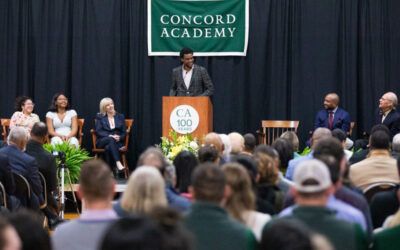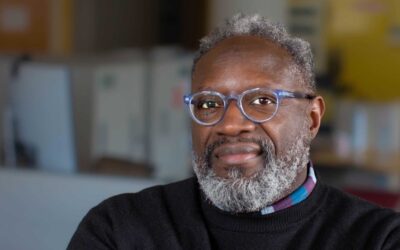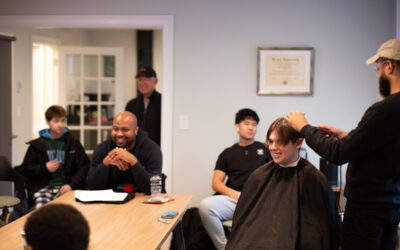Music: “I’ve Grown Accustomed to Your Face” (from the 1956 musical My Fair Lady; music by Frederick Loewe and lyrics by Alan Jay Lerner; performed by Rex Harrison)
Good morning, everyone, and welcome back. It is a pleasure to be here with you. I want to extend a special welcome back to a number of students who are returning to CA for the spring semester after being away in the fall: From CITYterm, Cole Chapman, Greer Harnden, and Selina Jiang; from HMI, Chaney Dalton; from Maine Coast Semester — Diana Sanchez and Andrei Shpilenok; and from School for Ethical and Global Leadership — Annie Lubin. Several other students will be spending the spring semester away from CA: Emma Croll to HMI; Ceili Lemus to CITYterm; Audrey Lin to The Mountain School; and Jess Sang to Maine Coast Semester. Several more students have been attending various School Year Abroad programs since the start of the year, and they will continue their studies abroad through the coming semester: Adrian Balvuena in France; Niki Diallo in Italy; Rony Fernandez in Spain; and Ethan Nelson and Vance White in China.
Let me begin by congratulating all of you on successfully completing the fall semester. What goes on here at CA every day — the level of engagement, the commitment from students and adults, and the unique sense of community — is rare and wonderful, and it begins with our collective willingness to take that first step into the unknown, and to take the next step, and the next, with others by our side: classmates, teachers, housemates, train mates, and teammates, along with teachers, coaches, advisors, house faculty. The bonds we make with one another require our attention and our care. As Adam Bailey encouraged us in his Convocation remarks last September, to “think less about what you want to accomplish by the end of your journey and more about the people you will meet along the way.” That is an important piece of advice, because even as we engage in the “work” of school — to take risks, to try new things, to confront difficult questions – we must also reach across the distance between us and build connections.
I think we also owe a special thanks to the senior class, who have done a great job of setting a positive tone as CA’s student leaders — in their chapel talks, which have been intelligent, authentic, and humorous; in their leadership on athletic teams this fall; in their energy and creativity as performers and makers of art; and for their engagement each and every day. We are grateful to them, and we look forward to celebrating the class of 2018 in the spring.
As is sometimes the case in my chapels — perhaps even often — what I have for you today is divided into parts. Three parts. Three distinct and seemingly unconnected segments that will, in a subtle, one might say even a mystical, way demonstrate their harmony by the time the chapel bells rings. At least I hope that they will. It is also possible that, by the time the chapel bell rings and I raise my arms, you will walk out into the morning still searching for meaning. We will just have to chance it.
Part I.
A few weeks ago, I was talking with an acquaintance of mine, a man whom I admire for his ability to capture an idea with elegant brevity. We were talking about aging, and what he and I concluded was that, whatever physical or mental changes we had encountered — and there certainly are a few, whether it is how fast we can run or how readily we can find the right word or how late we can stay awake – we do not feel old. This was something of a revelation to me because, as I told him, when I was a kid I imagined that growing older would be akin to a snake sloughing off successive skins; with each passing year I would shed this insecurity or that odd habit, would sharpen certain skills and master essential attitudes. I would, in this way, become a different person — the person I wanted, aspired, hoped to be. Granted, I was fairly certain that I would never achieve “cool,” regardless of how this molting process went. And I was right about that. I experienced “cool” the way one experiences a missed exit sign on a highway: it is visible, but it is in the rearview mirror, slightly distorted, smaller than one hoped, receding second by second, and then gone altogether.
But I digress.
Alongside this strange and unexpected state of not feeling old was another, perhaps even more unexpected reality: that, in most ways, I am the same person I have always been.
“Yes,” said my friend, “we bring ourselves with us.”
He was right. We do bring ourselves with us. While it’s true that I have shed a few habits — I no longer chew my fingernails to the quick as I did as a 12-year-old, or start most sentences with the word “Clearly,” as I did as an 18-year-old — I can still feel that 12-year-old kid inside me, along with the awkward college freshman, the nervous bridegroom, and the even more nervous young father. They are all there. What is new is the degree to which I see and welcome all of them.
Accepting oneself and one’s limitations can be liberating, and I discovered that the process of doing so led me to see and appreciate what others around me can contribute. Do not get me wrong — there are still many things I wish to do: chief among them, to play a musical instrument (I played the triangle in elementary school, but I think I would like to venture further). I had thought the cello might be a good choice — it’s substantial, one is seated while playing it, and it produces incredible, soulful sounds. I have not found the time to do much more than my version of the “air cello” so far — hey, it’s a start — but it is still on my list.
Let me say one more thing about this: Here at CA you will study a great many subjects, though I would suggest that chief among them is yourself. Understand who you are, how you learn, how you think, what moves you, and what amuses you. Work hard, stretch yourself, be patient, and see what others are and do around you.
Part II.
When I first started teaching, I made detailed notes in preparation for every class; I tried to chart every moment, building a kind of script to ensure that the class would make the progress that it needed to make. Needless to say, spontaneity was not my strong suit. I sat in on other teachers’ classes as often as I could, just to try to understand how they made it look so easy. One in particular was Kay Herzog. Kay had a unique way of launching a class discussion; she would open her book not to a predetermined page, but to a randomly chosen passage. And off the class would go. I sat in on Kay’s class a number of times and I can tell you that she was masterful at overseeing a discussion, at drawing her students out and getting them to grapple with the text, whether that was Shakespeare or Toni Morrison. What she was trying to say by starting in that seemingly random place was that the beginning was incidental — one had to begin somewhere — but what was more important was how and where things went from there. Over time, her students took over the choosing of the passage as well as much of the navigation during each discussion. That, of course, was the whole point. At its best, a class is an entity that creates itself as it goes; it is new, somewhat uncertain, but filled with possibilities; a collection of people that has never gathered together before, so even though there might be a plan, perhaps even a syllabus, these individuals will collectively chart their own path within that framework, according to their needs, their questions. That’s as it should be.
While the experience of being in a class does have inherent meaning, it is also important in the way that it prepares students for taking a role in the world. A few years ago, Harvard President Drew Gilpin Faust reflected about her own experience at CA as a member of the class of 1964 and about the lessons she had learned from Head of School Elizabeth Hall. Chief among those lessons was that a CA education “is not about what college you get into or what honors you may achieve. It is about truth, justice, mercy, service, love.” It is, she told us that day, about making “a better world.”
Our aim every day and every year is to uphold our mission and our values — love of learning, appreciation for diversity, and common trust. The work of doing so is not only what we owe to this community, but it is what we owe to the world beyond this campus. That world needs every single one of us to make it work, to make it live. It is the work of a lifetime, but if we can strive to build communities wherever we find ourselves, we will be contributing to an effort far larger than ourselves. It is the work of building society, work that has no end, and it is work that, if we commit ourselves to it, will be worth it.
Part III.
The wisdom of others. I want to close by reading a poem by Elizabeth Alexander, a poem composed for a very special occasion that took place on January 20, 2009. It speaks, I think, to both the work and the hope of living.
Praise Song for the Day
By Elizabeth Alexander
A Poem for Barack Obama’s Presidential Inauguration
Each day we go about our business,
walking past each other, catching each other’s
eyes or not, about to speak or speaking.
All about us is noise. All about us is
noise and bramble, thorn and din, each
one of our ancestors on our tongues.
Someone is stitching up a hem, darning
a hole in a uniform, patching a tire,
repairing the things in need of repair.
Someone is trying to make music somewhere,
with a pair of wooden spoons on an oil drum,
with cello, boom box, harmonica, voice.
A woman and her son wait for the bus.
A farmer considers the changing sky.
A teacher says, Take out your pencils. Begin.
We encounter each other in words, words
spiny or smooth, whispered or declaimed,
words to consider, reconsider.
We cross dirt roads and highways that mark
the will of some one and then others, who said
I need to see what’s on the other side.
I know there’s something better down the road.
We need to find a place where we are safe.
We walk into that which we cannot yet see.
Say it plain: that many have died for this day.
Sing the names of the dead who brought us here,
who laid the train tracks, raised the bridges,
picked the cotton and the lettuce, built
brick by brick the glittering edifices
they would then keep clean and work inside of.
Praise song for struggle, praise song for the day.
Praise song for every hand-lettered sign,
the figuring-it-out at kitchen tables.
Some live by love thy neighbor as thyself,
others by first do no harm or take no more
than you need. What if the mightiest word is love?
Love beyond marital, filial, national,
love that casts a widening pool of light,
love with no need to pre-empt grievance.
In today’s sharp sparkle, this winter air,
any thing can be made, any sentence begun.
On the brink, on the brim, on the cusp,
praise song for walking forward in that light.
Thank you for listening, everyone. Here’s to the start of the second half of the year.
Music: “Appalachia Waltz” (Yo-Yo Ma)


